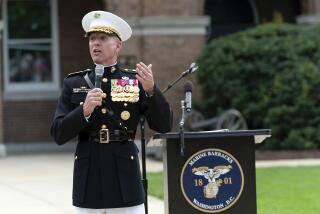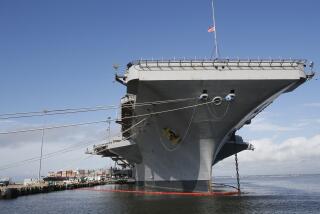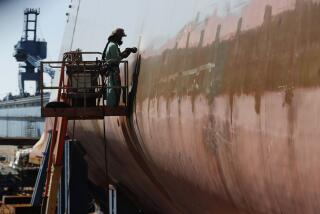PORT HUENEME : Captain Takes Top Warfare Center Post
- Share via
Under cloudless skies, Capt. John S. Beachy on Wednesday assumed command of the Naval Surface Warfare Center in Port Hueneme.
Beachy, 48, a former commander of two Navy vessels and skipper of an 18 1/2-foot sailboat in his leisure time, relieved Capt. Richard D. Williams III, director of the center since Feb. 21, 1990.
Williams was promoted to director of warfare systems architecture and engineering at the Space and Naval Warfare Systems Command in Washington.
The Port Hueneme center, unofficially called Nemesis, is a collection of engineers, scientists and sailors who test, install and maintain the Navy’s most sophisticated weapons systems and keep Navy ships ready for war.
“There was no other assignment in the Navy that I sought,” Beachy said after the ceremony. “This was it, because the people were so exceptional.”
As director, Beachy will oversee 2,526 civilian and 117 military workers and a $484-million annual budget. Most Nemesis employees work in a high-security compound within the Seabee base in Port Hueneme.
Before his new assignment, Beachy was project manager of the NATO Seasparrow Surface Missile System Project in Washington. Beachy served in river patrol units in South Vietnam in 1968 and 1969 and has also worked for the Navy’s high energy laser weapon research project.
His first assignment after graduating from the U. S. Naval Academy in 1966 was to join the crew of a 29-foot yacht in a trans-Atlantic race from Bermuda to Denmark.
Beachy was born in San Antonio, Tex. He and his wife, Pat, have three children.
Rear Adm. Philip M. Quast, guest speaker at the change of command ceremony, said Nemesis will continue its vital role keeping ship weapons ready for war--even though the Navy is under great pressure in Washington to slash its budget.
“They say the threat is hard to find. Sometimes they go so far as to say the threat has disappeared,” said Quast, deputy assistant chief of naval operations for surface warfare. “I have grave doubts about lessening the capability on naval surface ships, particularly warships. I don’t see a vacuum of threats at all.”
Quast cited as worrisome Iran and China’s military buildup and the development of nuclear weapons in “questionable neutral countries” such as North Korea.
“The threat is clear to us and it’s demanding of our best efforts,” he said.
More to Read
Sign up for Essential California
The most important California stories and recommendations in your inbox every morning.
You may occasionally receive promotional content from the Los Angeles Times.









